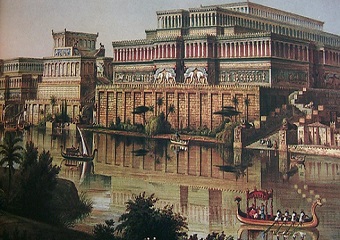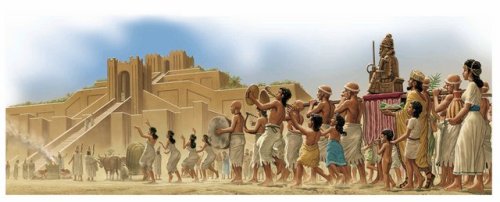
Introduction by ACME Game Developer Fred Schachter: The previous parts of this Chapter One introduced readers to the game’s Great Person Investment, Competition, and Spy cards. This exposition now proceeds to cards with much varied, but never-the-less valuable attributes. Having additional background regarding this forthcoming GMT P-500 listed game should assist a reader’s appreciation of this article series. This can be obtained from material resident in GMT’s site for the game: GMT Games – Ancient Civilizations of the Middle East
But first a word from Designer Mark McLaughlin…


VARIOUS PURPOSED GREAT PERSON CARDS – POWER, MONEY (MINA), & VP: There are eight of these. We’ll save the three “money” Great Person cards for last.

The Grand Astrologer: This Great Person presents two intriguing possibilities… which one to select is contingent on your Civilization’s circumstance.
The Gilgamesh Step occurs after each of a game’s Civilizations determines its turn order for the upcoming turn. This is generally in order of the Civilization with the greatest number of Cities going first, followed by the Civilization with the second number of Cities, next, etc. If there’s a tie, the Civilization with less VP chooses sequence between the tied players.
So being able to exchange Turn Order position with another Civilization could prove a huge advantage: for example, going last so you know what the other Civilizations do with their disk placements before you make a commitment. There could also be a time you’d like to go first to grab key territory before another Civilization does so.
The other way to play this card is as a kind of “spy”, but in this case its not to learn what’s in another Civilization’s hand, but what cards are in the offing BEFORE they’re dealt in Civilization Turn Order. Just beware playing this card when you’re in the VP lead since any Barbarian Event invasions must be played if revealed and your Civilization could well become the target!

Singer of Songs: The advantage of this Great Person card is your crooner can not only apply persuasive musical talents upon other Civilizations (and you can target more than one Civilization); but can even sway the hardened hearts of Barbarians!

Queen of Sheba: This card conveys “triple threat” benefits… two new disks to reinforce one or two areas under your Civilization’s control, a new card from the draw deck for your hand, and a mina as well!
These attributes can help one truly appreciate the Queen of Sheba’s enticements. Nice!

Rabble Rouser: This Great Person card is distinct as it requires the victim Civilization to have its disks “replaced” rather than “removed”. This is an important Ancient Civilizations of the Middle East distinction from its Ancient Civilizations of the Inner Sea predecessor, for a Civilization may expend a mina or discard a card in lieu of losing a disk. If a disk that is to be “replaced” is so rescued, the active civilization or Barbarian does not place their own disk – (what has not been removed cannot be replaced).
Therefore, the Rabble Rouser can be thwarted from placing his black Barbarian disks if the victim Civilization can make requisite pay-offs to avoid trouble, in either mina and/or cards from its hand. It seems some things haven’t changed much from ancient times, eh?

False Prophet: This is one of the most powerful of ACME’s Great Person cards. It is almost a kind of “Negate” card in that it suppresses the victim Civilization’s Deity from normal use during the remainder of the Epoch unless it is negated, which can occur during any of the Epoch’s Card Phases, or the Epoch ends.
The punishment does not end there. The False Prophet deprives the victim from collecting any Deity-related Victory Points for the entire Epoch. That includes the Civilization’s own Deity as well as any Deities it has captured.
It also takes the victim Civilization’s temple granary ability away. The granary ability allows a Civilization to convert two of its Growth Phase disks into a mina.
This card is a kind of “great equalizer” to play against a Civilization with a substantial VP lead. It can level the playing field under the right circumstances.

Gold Smith: This is a handy card to get during a game’s early stages when resources are scarce.
Building a temple for your Civilization’s Deity costs five resources. A resource is a card from your hand, a mina from your treasury, or one of your Civilization’s colored disks from anywhere on the game map.
Two resources for building or re-building your Civilization’s temple must always be disks from the map; but it’s nice only requiring one more resource due to the Gold Smith’s ability.
Furthermore, if a Civilization already has a Deity, the Gold Smith is certainly a nice source for two additional mina being placed into its treasury!

Necromancer: Your target Civilization, which needs at least 10VP to be vulnerable to this Great Person card, likely has better things to do with three resources than apply them in response to the Necromancer’s wiles.
During play testing, it was rare for a player to sacrifice a Victory Point since the needed resources were generally available… oh, but the exclamation of “why me?” could create quite the scene around the table!

Money Changer: This can be a truly annoying card to any opposing Civilization to your own which accrues a decent quantity of VP during a game’s course.
You don’t have to play a long game of ACME of all four Epochs… even a single Epoch is a complete game if players agree to a limit prior to commencing a contest.
But during play testing we did conduct games for the full five Epochs and with that amount of time it’s possible for a Civilization to accrue quite a quantity of VP. It could, therefore, suffer damage; particularly when the Money Changer card player waits until the victim has no mina remaining in treasury or use this card to deplete a Civilization of its mina wealth.


Coming up… Part 5, the concluding segment of this article series’ Chapter One: The Great Person “Negate” Cards of Ancient Civilizations of the Middle East!
Previous Articles:
Next Articles:



